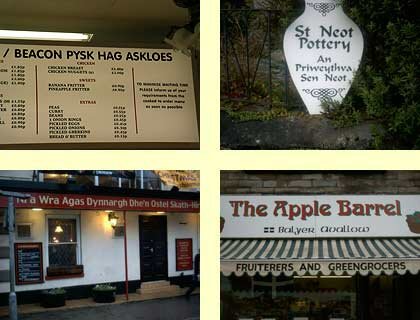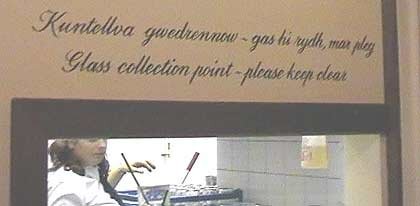Deryvas yn kever avonsyans yn dysplegyans
an Yeth Kernewek dres an vledhen 2007An vledhen 2007 re be bledhen gales, gwarthevys del o gans an edhom bras a gafos acord war an lytherenyeth rak adhyskans formel ha defnyth poblek. Kyn campoll an deryvas-ma an vledhen 2007, ha materow ow tysplegya ha chanjya yn uskys, y cowsaf ynweth a wharfosow bys dhe’n myttyn-ma, poken y hevelsa an deryvas-ma nebes coth dhe lyes den.
Re bya lonchys an argerth dhe ordena Furf Scryfys Savonek dhe’n Kescusulyans Tremogh 2006 ha profyansow dhyworth nep 200 den ve degemerys kyns an lynen-varow a’n 31ns mys-Merth 2007, keffrys ha’n re dhyworth cowethasow an yeth ha korfow erel, y’ga mysk Gorseth Kernow. An Desedhek a yethoryon geryes da dres oll an bys re dowlensa a wul deryvas kensa dalleth mys-Gortheren ha deryvas finek mys-Gwyngala, mes y’n dyweth yth ervyras a wul deryvas lun dhe’n nessa Kescusulyans Tremogh mys-Gwyngala. An deryvas-ma ny dhewysas nep un lytherenyeth yn-few solabrys mes comendya omgusulyans rak cafos kesvoth yn-mysk kernewegoryon.
Report on progress in the development
of the Cornish Language during 2007The year 2007 has been a difficult year, dominated as it was by the urgent need to find agreement on a spelling system for formal education and public use. Although this report refers to 2007, as matters are developing and changing rapidly I have included happenings up to this very morning, otherwise the report would seem rather out of date to many people.
The process to establish a Standard Written Form had been launched at the Tremough Conference of 2006 and submissions from some 200 individuals were received before the 31 March 2007 deadline, in addition to those from language organisations and other bodies, including Gorseth Kernow. The Commission of internationally renowned linguists had intended to make a preliminary report early in July and a final report in September, but in the end decided to make a full report to the second Tremough Conference in September. This report did not choose one of the existing orthographies but recommended discussions to find a consensus amongst Cornish speakers.

To this end, a group was established consisting of 8 users of the language (6 of whom were bards), chosen from a list of nominations submitted by the various language bodies. This group was under the chairmanship of Dr Trond Trosterud from Norway, with the technical support of Albert Bock an Austrian linguist and our bard Brogh (Ben Bruch), with note-taking and general vital support from Gwythvosen, Jenefer Lowe, and Losowenn an Hav, Elizabeth Stewart. After four days in purdah in the Youth Hostel at Treyarnon Bay, we emerged totally exhausted but with an agreement. This agreement was tidied up and developed by Messrs. Bock and Bruch and the crucial end-game of the process began, with a series of meetings of the language bodies to persuade them to support the Standard Written Form, which most have now done.
This whole process was initially divisive and extremely difficult—individuals were in entrenched positions and I found myself on the Language Board with the unsettling task of arguing strongly with people who had been close colleagues for some 30 years. However, we have emerged from the process with an agreed way forward and we are still friends. I believe this applies also to other language bodies where the debates have been equally intense. What we need now is a period of stability, and to that end, it has been agreed that there would be no further amendment to the SWF for five years, so there will be a review in 2013. This will mean that the Languages Ladder system of assessments, mainly in schools, can have a chance to bed down and teacher training can continue and gain momentum.
The Cornish Language Board has continued its series of training days for teachers and the Partnership will during the summer be running days for those teachers keen to start using the assessment materials in the autumn. The assessment materials at Breakthrough and Preliminary levels have now been prepared and a training day for teachers by Vivienne May (Asset Languages) and Kate Green (Modern Languages section of the DforCSF) has taken place this week.
The funding package approved in early 2006 is about to come to an end and the application to the Government for funding for the next 3 years has been submitted and is being processed. Reports to the funding providers on the progress made in developing the language over the past 2½ years are being completed and submitted. Despite so much energy being put into finding a consensus on the orthography, considerable advances have been made. This morning the series of books and DVDs for primary schools, entitled Tales from Porth, were launched at Waterstone’s in Truro. Successfully piloted at Lanlivery and Marlborough Primary School, Falmouth, this will be made available to schools as demand grows.
The Language Board has found that so much time has been spent on the spelling issue that its own publications schedule has fallen behind. Extra effort will be made this year to deal with the backlog.
On the international scene, the UK Committee of the European Bureau for Lesser-used Languages, of which Cornish has been a member for some 25 years, has stirred into life after a dormant period. A meeting was held near Bristol Airport when it was made clear that most future activity would have to be funded by the Subcommittees themselves. Funding from the EU has been reduced little by little over many years until there is now virtually none, just a small pot of money for very limited projects. On the positive side:
- We have been freed from the democratic requirements that instigated the establishment of our subcommittee in 1995, so in future a delegate nominated by the Partnership would be acceptable. It may therefore be possible before long to wind up the subcommittee formally, declaring it to have done its job over some 14 years, rather than let it fade away.
- Profoes an Mordid, Dr Ken George, was elected one of the 10 directors of the UK Committee.
- This week, I am attending the launch in Brussels of the Network for the Promotion of Linguistic Diversity. The network consists of governmental language boards, national and regional governments involved in language planning and EBLUL as full members, and various academic institutions and NGOs as associate members. Our Partnership falls into the latter category of associate membership. {I am writing this report before going to Brussels.} The aims and objectives are sharing good practice, developing new projects, establishing a language-friendly environment and disseminating information.
The Partnership’s translation service has supplied some 240 translations to the general public and to commercial organisations for purposes as diverse as restaurant menus and tattoos, house names and father’s day greetings, and the figures are growing each quarter. These translations have been supplied in 4 spelling forms unless the client requests a specific form. A seminar for translators was held in July with an experienced trainer who has worked in the Foreign Office Translation Department. This session was non-language specific. It is hoped to arrange further training for translators, this time focussing on Cornish and using ‘home grown’ knowledge and experience.
Since the announcement of the agreement on spelling for ‘formal education and public use’, there have been more requests for translations in the Standard Written Form. It appears that the general public is taking this agreement beyond the bounds set by the Partnership. I believe this reflects a widespread relief felt throughout Cornwall that there is now a Standard Form and the hope that the unpleasant arguments can be a thing of the past. Those of us who have been involved in the discussions over a long period are not so naïve as to think things will be ‘all sweetness and light’ overnight. There is still a certain fragility which makes it all the more important that a widely respected body like the Gorsedd should show its support for the agreement. The final specification document has only just become available. It would be neither right nor fair to rush through any change to the Gorsedd position before everyone has seen this document. However, I believe it is important that the Gorsedd sends a strong and clear message of support for the agreement.
Ytho, an vledhen 2007 ha’n kensa whegh mys a 2008 re be cales dres eghen mes war’n enep bosedhek, y clewaf ny dhe gowlwul mur ow sawya golyow a’n termyn us passyes ha gorra yn hy le sel rak an termyn a dhe.
So, 2007 and the first half of 2008 have been very difficult but on the positive side I feel we have achieved a great deal in healing the wounds of the past and laying foundations for the future.
CARADOK, Cannas Gorseth Kernow dhe’n Kescowethyans. 14.06.2008
Declaration from the Closed Gorsedd:The Council of Gorseth Kernow, the Cornish Gorsedd, is very grateful to all those involved at a high level in the Process to find a Standard Written Form and the vital contribution they have made. Their commitment has been tremendous and their dedication and persistence praise-worthy.
The Gorseth supports the Cornish Language in its entirety: that is all forms, though the Council voted in February 1988 to retain the status quo and continue using Unified Cornish until such time as there be a majority vote at the Closed Gorseth for change. This was confirmed at the Closed Gorsedd in June that year. This was in order to stay above the arguments which have taken place about the various forms of Cornish.
The Council of Gorseth Kernow supports the Standard Written Form of Cornish which has been agreed for use in Formal Education and for Public Use. It is inevitable that supporters of each form will have their reservations as it has been essential to compromise, but it is now that barriers can be removed and bridges built. Once bards have had time to read and digest the document on the Standard Written Form, it is intended that it should be put to the Closed Gorseth that it be adopted in Ceremonies and documents.
Web site maintained 2004-2008 Rob Follett Computer Services, logo copyright © 2001, 2002 neshaver
All images copyright © The Gorseth of Cornwall unless otherwise attributed
|

